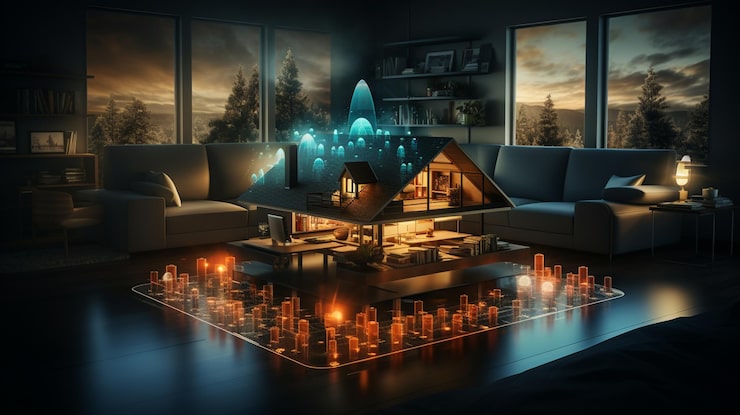The concept of a “smart home” has been around for years, promising convenience, efficiency, and futuristic comfort. But a new wave of innovation is reshaping what that term truly means. Imagine a home that doesn’t just respond to commands — but anticipates your needs, plans your routines, and learns your lifestyle patterns autonomously. Welcome to the era of Agentic AI, a technology that brings self-driven intelligence to our living spaces.
This isn’t science fiction anymore. With advances in artificial intelligence, automation, and IoT (Internet of Things), homes are evolving from static environments into adaptive, intuitive ecosystems. Agentic AI sits at the center of this transformation, changing how we interact with our surroundings and how designers think about the spaces we inhabit.
What Is Agentic AI?
Traditional smart home systems operate reactively. They wait for a command — “turn off the lights,” “adjust the thermostat,” or “lock the door.” In contrast, agentic AI takes initiative. It’s powered by software “agents” that observe, reason, and act independently to achieve specific goals.
In simple terms, Agentic AI enables systems to make decisions on their own — just like a personal assistant that learns over time and continuously improves. It’s not just about following rules but about understanding context, predicting behavior, and coordinating multiple devices or services to create a seamless living experience.
For instance, imagine an AI that knows you wake up at 6:30 AM, prefers natural light, and enjoys freshly brewed coffee. Without you saying a word, your home opens the blinds, starts your coffee machine, and plays your morning playlist — all triggered by your typical schedule and mood patterns.
Why Agentic AI Is a Game-Changer for Home Design

Interior design and home architecture are often about crafting spaces that feel alive — spaces that reflect personality, comfort, and function. With Agentic AI, that “living” quality takes on a literal meaning.
Here’s how this technology is redefining the design process and home experience:
1. Personalized Environments
Every homeowner has unique preferences. Agentic AI can learn and adjust settings to suit those preferences automatically. From lighting temperatures to air quality control, your home evolves with your lifestyle. Designers can now integrate dynamic systems that adapt in real-time a fusion of aesthetics and intelligence.
2. Predictive Energy Efficiency
Sustainability is a key focus in modern design. Agentic AI can help optimize energy use by learning consumption habits and predicting when systems should power up or down. This means reduced waste, lower utility bills, and a greener footprint all achieved without constant human oversight.
3. Enhanced Safety and Security
A home infused with autonomous intelligence can detect anomalies faster than traditional systems. Whether it’s identifying unusual movement, monitoring air quality, or spotting electrical faults, Agentic AI brings proactive safety. It doesn’t wait for a security breach or system failure it anticipates and acts.
4. Effortless Maintenance
Forget the stress of remembering maintenance schedules. Your home could soon remind you when it’s time to change filters, clean appliances, or schedule a service. By learning from sensor data and usage trends, an agentic system becomes your invisible caretaker.
The Role of Designers and Developers
The rise of autonomous home intelligence opens new horizons for professionals in design and technology. Architects, designers, and software developers are beginning to collaborate more closely, blending artistry with computational logic.
1. Design Thinking Meets Data Science
Home design is no longer just about materials and layout it’s also about data. Designers are learning how people move through spaces, how they interact with light, and how they feel in different conditions. By merging this with AI analytics, they can craft spaces that respond emotionally and functionally.
2. From Reactive Apps to Intelligent Agents
Developers, on the other hand, are transitioning from coding simple “if-this-then-that” rules to creating multi-layered, self-learning systems. This process — known in the tech world as agentic ai development — focuses on building digital agents that can plan, act, and communicate with minimal human input.
3. The Human Element Remains Essential
Despite its autonomy, AI is not replacing human creativity. The role of designers becomes even more critical — they define the values and aesthetics guiding these intelligent systems. After all, technology may power the home, but humans give it heart and soul.
Challenges and Ethical Considerations

As with any breakthrough technology, there are important challenges to consider.
- Privacy and Data Protection: Since these systems learn from personal behavior, securing that data is crucial.
- Reliability: Over-automation can lead to dependency. Systems must have failsafes and manual overrides.
- Ethical Design: AI decisions should always align with human values, ensuring fairness, transparency, and safety.
Responsible agentic design means balancing autonomy with control. The best homes of the future will be those that respect boundaries — offering help, not intrusion.
The Road Ahead
We are standing at the edge of a major transformation in how we live and interact with our homes. As agentic AI continues to evolve, our living spaces will grow more self-aware, more intuitive, and more attuned to our emotional and physical well-being.
For homeowners, that means unparalleled convenience. For designers, it means a new creative playground where walls and furniture are no longer static, but part of a responsive, intelligent network. And for technologists, it signals the dawn of a truly interactive, autonomous home.
The age of passive living is over the future belongs to intelligent spaces that think, adapt, and care for us in ways we once only dreamed of.






